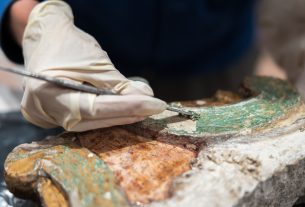Dealing with cancer in children is hard enough. Knowing that there are huge disparities in survival rates between higher- and lower-income countries in Europe makes it even worse. But EU-funded researchers are working to address this.
Dr Jelena Rascon, a paediatric cancer specialist at the Vilnius University Hospital Santaros Klinikos (VULSK) in Lithuania, places great importance on the benefits of international cooperation when dealing with cancer – particularly when it comes to children.
Increasing the odds
“There are still inequalities across European countries in terms of childhood cancer survival rates,” said Rascon, who led a three-year EU-funded research initiative called TREL that began in 2021 and concluded in December 2023. The researchers aimed to improve childhood cancer treatment through greater cooperation between European countries.
Thanks to funding from the EU, Dr Rascon and her colleagues were able to work closely with partners in Austria, Belgium, Denmark, France, Germany, Italy and the Netherlands to reduce persisting disparities and improve survival rates across Europe for children with certain types of cancer.
This was done through twinning, a concept that allows specialists to network and cooperate more easily with colleagues in other countries where research in a specific area is deemed to be more advanced.
The TREL team focused on the treatment of solid cancerous tumours in children and, more specifically, on brain tumours, neuroblastoma and renal tumours.
Brain tumours are among the most common types of childhood cancers, along with leukaemia and lymphoma. Although childhood cancers are very rare and have a high overall survival rate, they remain the first cause of death from disease in children and adolescents, with an estimated 2 000 deaths every year in Europe.
“
There are still inequalities across European countries in terms of childhood cancer survival rates.
To help increase the odds of survival, the children taking part in the study had access to personalised treatment plans and follow-ups agreed collectively by the research team.
In some cases, doctors were able to work with geneticists and bioinformatics specialists from institutions in other European countries – with considerable positive impact for their young patients and their families.
Improving survival
In the EU, an estimated 14 000 cases of childhood cancers are recorded every year, according to the European Cancer Inequalities Registry.
The registry puts survival rates at between 73% in Bulgaria and 74% in Lithuania, to 86% in Denmark and 85% in Austria. To put it more simply, for every 100 children with cancer, 12 more will survive in Denmark than in Lithuania.
The good news is that the prognosis for children with cancer is improving in Lithuania. According to Rascon, the increase in cross-border exchanges organised as part of the TREL cooperation has been an important part of that.
The TREL researchers’ objectives align well with Europe’s Beating Cancer Plan, especially its ‘Helping Children with Cancer’ initiative, as well as the EU Cancer Mission’s science-based approach toward reducing cancer burden and inequalities across the EU.
International solidarity for better care
Dr Goda Vaitkevičienė, a colleague of Rascon’s and a paediatric haematologist at VULSK, also acknowledges the importance of international solidarity in improving the health outcomes for children everywhere.
Vaitkevičienė worked on two pan-European studies of treatment protocols for children and adolescents with acute lymphoblastic leukaemia (ALL) called NOPHO ALL2008 and ALLtogether.
These aimed to improve childhood leukaemia survival rates through clinical trials that, like TREL, included the sharing of data, treatment plans and information between doctors in different European countries.
“
We are not just talking about treatment, but also quality of life.
International cooperation is particularly important in a field like paediatric cancer, said Vaitkevičienė. She pointed out that as these cancers are extremely rare, it is difficult to have a sufficient number of patients to conduct effective studies and compare protocols within the borders of just one or several small countries.
For Rascon, the work carried out by the TREL team brought increased knowledge, better access to innovations and better access to international collaborative research.
“When you’re in a research group, you can provide much better care to your patients, more innovative, more tailored. In paediatric oncology, research is a platform to provide better care,” she said.
Future outlook
Thanks to the work carried out by the TREL researchers, the team has been able to secure funding for a new project, SCARLET, set to begin in October 2024, allowing it to carry on making improvements.
The advantages go both ways, with data related to the Lithuanian children involved in the clinical trials now feeding into a Europe-wide study that can improve overall cancer treatment outcomes elsewhere.
For patients, the improved survival outcomes may be the headline figure, but they are not the whole story, said Vaitkevičienė.
“We are not just talking about treatment, but also quality of life. Not only after, but also during the treatment,” she said. Up to 70% of children undergoing chemotherapy are affected by at least one severe side-effect, including serious infections, acute or long-term organ damage, thrombosis and metabolic disorders.
Sharing data can help doctors avoid complications for their patients and reassure them while they are being treated. It also boosted the confidence of the doctors working at the hospital.
“You can talk to the patients slightly differently,” said Vaitkevičien.
“You’re more confident when you can say this is not our treatment plan alone, children in other countries are treated in the same way,“ she said. “All this adds to their quality of life.“
Research in this article was funded by the EU’s Horizon Programme. The views of the interviewees don’t necessarily reflect those of the European Commission. If you liked this article, please consider sharing it on social media.



